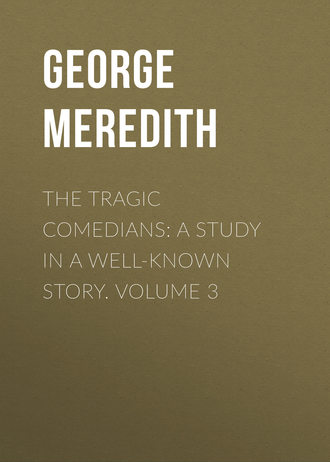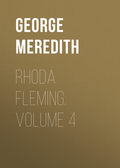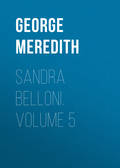
George Meredith
The Tragic Comedians: A Study in a Well-known Story. Volume 3
CHAPTER XV
He slept. Near upon morning he roused with his tender fit strong on him, but speechless in the waking as it had been dreamless in sleep. It was a happy load on his breast, a life about to be born, and he thought that a wife beside him would give it language. She should have, for she would call out, his thousand flitting ideas now dropped on barren ground for want of her fair bosom to inspire, to vivify, to receive. Poetry laid a hand on him: his desire of the wife, the children, the citizen's good name—of these our simple civilized ambitions—was lowly of the earth, throbbing of earth, and at the same time magnified beyond scope of speech in vast images and emblems resembling ranges of Olympian cloud round the blue above earth, all to be decipherable, all utterable, when she was by. What commoner word!—yet wife seemed to him the word most reverberating of the secret sought after by man, fullest at once of fruit and of mystery, or of that light in the heart of mystery which makes it magically fruitful.
He felt the presence of Clotilde behind the word; but in truth the delicate sensations breeding these half-thoughts of his, as he lay between sleeping and waking, shrank from conjuring up the face of the woman who had wounded them, and a certain instinct to preserve and be sure of his present breathing-space of luxurious tranquillity kept her veiled. Soon he would see her as his wife, and then she would be she, unveiled ravishingly, the only she, the only wife! He knew the cloud he clasped for Clotilde enough to be at pains to shun a possible prospect of his execrating it. Oh, the only she, the only wife! the wild man's reclaimer! the sweet abundant valley and channel of his river of existence henceforward! Doubting her in the slightest was doubting her human. It is the brain, the satanic brain which will ever be pressing to cast its shadows: the heart is clearer and truer.
He multiplied images, projected visions, nestled in his throbs to drug and dance his brain. He snatched at the beauty of a day that outrolled the whole Alpine hand-in-hand of radiant heaven-climbers for an assurance of predestined celestial beneficence; and again, shadowily thoughtful of the littleness of the thing he exalted and claimed, he staked his reason on the positive blessing to come to him before nightfall, telling himself calmly that he did so because there would be madness in expecting it otherwise: he asked for so little! Since he asked for so little, to suppose that it would not be granted was irrational. None but a very coward could hesitate to stake his all on the issue.
Singularly small indeed the other aims in life appeared by comparison with this one, but his intellect, in the act of pleading excuses for his impatience, distinguished why it should be so. The crust, which is not much, is everything to the starving beggar; and he was eager for the crust that he might become sound and whole again, able to give their just proportion to things, as at present he acknowledged himself hardly able to do. He could not pursue two thoughts on a political question, or grasp the idea of a salutary energy in the hosts animated by his leadership. There would have to be an end of it speedily, else men might name him worthless dog!
Morning swam on the lake in her beautiful nakedness, a wedding of white and blue, of purest white and bluest blue. Alvan crossed the island bridges when the sun had sprung on his shivering fair prey, to make the young fresh Morning rosy, and was glittering along the smooth lake- waters. Workmen only were abroad, and Alvan was glad to be out with them to feel with them as one of them. Close beside him the vivid genius of the preceding century, whose love of workmen was a salt of heaven in his human corruptness, looked down on the lake in marble. Alvan cherished a worship of him as of one that had first thrilled him with the feeling of our common humanity, with the tenderness for the poor, with the knowledge of our frailty. Him, as well as the great Englishman and a Frenchman, his mind called Father, and his conscience replied to that progenitor's questioning of him, but said 'You know the love of woman: He loved indeed, but he was not an amatory trifler. He too was a worker, a champion worker. He doated on the prospect of plunging into his work; the vision of jolly giant labours told of peace obtained, and there could be no peace without his prize.
He listened to the workmen's foot-falls. The solitary sound and steady motion of their feet were eloquent of early morning in a city, not less than the changes of light in heaven above the roofs. With the golden light came numbers, workmen still. Their tread on the stones roused some of his working thoughts, like an old tune in his head, and he watched the scattered files passing on, disciplined by their daily necessities, easily manageable if their necessities are but justly considered. These numbers are the brute force of earth, which must have the earth in time, as they had it in the dawn of our world, and then they entered into bondage for not knowing how to use it. They will have it again: they have it partially, at times, in the despot, who is only the reflex of their brute force, and can give them only a shadow of their claim. They will have it all, when they have illumination to see and trust to the leadership of a greater force than they—in force of brain, in the spiritual force of ideas; ideas founded on justice; and not the justice of these days of the governing few whose wits are bent to steady our column of civilized humanity by a combination of props and jugglers' arts, but a justice coming of the recognized needs of majorities, which will base the column on a broad plinth for safety-broad as the base of yonder mountain's towering white immensity—and will be the guarantee for the solid uplifting of our civilization at last. 'Right, thou!' he apostrophized—the old Ironer, at a point of his meditation. 'And right, thou! more largely right!' he thought, further advanced in it, of the great Giuseppe, the Genoese. 'And right am I too, between that metal- rail of a politician and the deep dreamer, each of them incomplete for want of an element of the other!' Practically and in vision right was Alvan, for those two opposites met fusing in him: like the former, he counted on the supremacy of might; like the latter, he distinguished where it lay in perpetuity.
During his younger years he had been like neither in the moral curb they could put on themselves—particularly the southern-blooded man. He had resembled the naturally impatient northerner most, though not so supple for business as he. But now he possessed the calmness of the Genoese; he had strong self-command now; he had the principle that life is too short for the indulgence of public fretfulness or of private quarrels; too valuable for fruitless risks; too sacred, one may say, for the shedding of blood on personal grounds. Oh! he had himself well under, fear not.
He could give and take from opposition. And rightly so, seeing that he confessed to his own bent for sarcastically stinging: he was therefore bound to endure a retort. Speech for speech, pamphlet for pamphlet, he could be temperate. Nay, he defied an adversary to produce in him the sensation of intemperateness; so there would not be much danger of his being excited to betray it. Shadowily he thought of the hard words hurled at him by the Rudigers, and of the injury Clotilde's father did him by plotting to rob him of his daughter. But how had an Alvan replied?—with the arts of peaceful fence victoriously. He conceived of no temptation to his repressed irascibility save the political. A day might come for him and the vehement old Ironer to try their mettle in a tussle. On that day he would have to be wary, but, as Alvan felt assured, he would be more master of himself than his antagonist. He was for the young world, in the brain of a new order of things; the other based his unbending system on the visions of a feudal chief, and would win a great step perchance, but there he would stop: he was not with the future!
This immediate prospect of a return to serenity after his recent charioteering, had set him thinking of himself and his days to come, which hung before him in a golden haze that was tranquillizing. He had a name, he had a station: he wanted power and he saw it approaching.
He wanted a wife too. Colonel von Tresten took coffee with him previous to the start with Dr. Storchel to General von Rudiger's house. Alvan consequently was unable any longer to think of a wife in the abstract. He wanted Clotilde. Here was a man going straight to her, going to see her, positively to see her and hear her voice!—almost instantly to hear her voice, and see her eyes and hair, touch her hand. Oh! and rally her, rouse her wit; and be able to tell him the flower she wore for the day, and where she wore it—at her temples, or sliding to the back hair, or in her bosom, or at her waist! She had innumerable tricks of indication in these shifty pretty ways of hers, and was full of varying speech to the cunning reader of her.
'But keep her to seriousness,' Alvan said. 'Our meeting must be early to-day—early in the afternoon. She is not unlikely to pretend to trifle. She has not seen me for some time, and will probably enough play at emancipation and speak of the "singular impatience of the seigneur Alvan." Don't you hear her? I swear to those very words! She "loves her liberty," and she curves her fan and taps her foot. "The seigneur Alvan appears pressed for time:" She has "letters to write to friends to- day." Stop that! I can't join in play: to-morrow, if she likes; not to- day. Or not till I have her by the hand. She shall be elf and fairy, French coquette, whatever she pleases to-morrow, and I'll be satisfied. All I beg is for plain dealing on a business matter. This is a business matter, a business meeting. I thoroughly know the girl's heart, and know that in winning the interview I win her. Only'—he pressed his friend's arm—'but, my dear Tresten, you understand. You're a luckier fellow than I—for the time, at all events. Make it as short as you can. You'll find me here. I shall take a book—one of the Pandects. I don't suppose I shall work. I feel idle. Any book handy; anything will interest me. I should walk or row on the lake, but I would rather be sure of readiness for your return. You meet Storchel at the General's house?'
'The appointment was at the house,' Tresten said.
'I have not seen him this morning. I know of nothing to prepare him for. You see, it was invariable with her: as soon as she met me she had twice her spirit: and that she knows;—she was a new woman, ten times the happier for having some grains of my courage. So she'll be glad to come to terms and have me by to support her. Press it, if necessary; otherwise she might be disappointed, my dear fellow. Storchel looks on, and observes, and that 's about all he can do, or need do. Up Mont Blanc to-day, Tresten! It's the very day for an ascent:—one of the rare crystalline jewels coming in a Swiss August; we should see the kingdoms of the earth—and a Republic! But I could climb with all my heart in a snowstorm to-day. Andes on Himalayas! as high as you like. The Republic by the way, small enough in the ring of empires and monarchies, if you measure it geometrically! You remember the laugh at the exact elevation of Mount Olympus? But Zeus's eagle sat on it, and top me Olympus, after you have imagined the eagle aloft there! after Homer, is the meaning. That will be one of the lessons for our young Republicans—to teach them not to give themselves up to the embrace of dead materialism because, as they fancy, they have had to depend on material weapons for carving their way, and have had no help from other quarters. A suicidal delusion! The spiritual weapon has done most, and always does. They are sons of an idea. They deny their parentage when they scoff at idealism. It's a tendency we shall have to guard against; it leads back to the old order of things, if we do not trim our light. She is waiting for you! Go. You will find me here. And don't forget my instructions. Appoint for the afternoon—not late. Too near night will seem like Orpheus going below, and I hope to meet a living woman, not a ghost—ha! coloured like a lantern in a cavern, good Lord! Covered with lichen! Say three o'clock, not later. The reason is, I want to have it over early and be sure of what I am doing; I'm bothered by it; I shall have to make arrangements . . . a thousand little matters . . . telegraph to Paris, I daresay; she's fond of Paris, and I must learn who's there to meet her. Now start. I'll walk a dozen steps with you. I think of her as if, since we parted, she had been sitting on a throne in Erebus, and must be ghastly. I had a dream of a dead tree that upset me. In fact, you see I must have it over. The whole affair makes me feel too young.'
Tresten advised him to spend an hour with the baroness.
'I can't; she makes me feel too old,' said Alvan. 'She talks. She listens, but I don't want to speak. Dead silence!—let it be a dash of the pen till you return. As for these good people hurrying to their traffic, and tourists and loungers, they have a trick for killing time without hurting him. I wish I had. I try to smother a minute, and up the old fellow jumps quivering all over and threatening me body and soul. They don't appear as if they had news on their faces this morning. I've not seen a newspaper and won't look at one. Here we separate. Be formal in mentioning me to her but be particularly civil. I know you have the right tone: she's a critical puss. Days like these are the days for her to be out. There goes a parasol like one I 've seen her carry. Stay— no! Don't forget my instructions. Paris for a time. It may be the Pyrenees. Paris on our way back. She would like the Pyrenees. It's not too late for society at Luchon and Cauterets. She likes mountains, she mounts well: in any case, plenty of mules can be had. Paris to wind up with. Paris will be fuller about the beginning of October.'
He had quitted Tresten, and was talking to himself, cheating' himself, not discordantly at all. The poet of the company within him claimed the word and was allowed by the others to dilate on Clotilde's likings, and the honeymoon or post-honeymoon amusements to be provided for her in Pyrenean valleys, and Parisian theatres and salons. She was friande of chocolates, bon-bons: she enjoyed fine pastry, had a real relish of good wine. She should have the best of everything; he knew the spots of the very best that Paris could supply, in confiseurs and restaurants, and in millinery likewise. A lively recollection of the prattle of Parisian ladies furnished names and addresses likely to prove invaluable to Clotilde. He knew actors and actresses, and managers of theatres, and mighty men in letters. She should have the cream of Paris. Does she hint at rewarding him for his trouble? The thought of her indebted lips, half closed, asking him how to repay him, sprang his heart to his throat.







